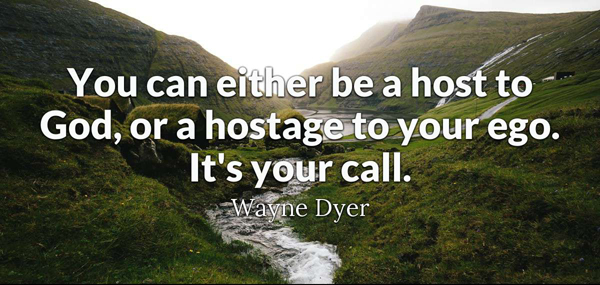Perspective
Finding the root cause of a problem
Editor's note
This is a story based on the experience of a seeker on the path of yoga, narrated in the first person. It illustrates some of the subtle and unseen inner quarrels and conflicts which go on within and among people living in a community, hidden behind a superficial and hypocritical camaraderie reinforced by social etiquette and culture. It also highlights the need to resolve these conflicts by finding their deeper cause.
I was working as an officer in a big firm in one of those concrete jungles of a metro. I am a seeker following an inner spiritual discipline. In general I had good relations with my colleagues in the office. There are of course passing and temporary conflicts which are inevitable in a group of people who have their egos, who are not yet enlightened sages! But I never had any prolonged or painful inner or outer conflict with my colleagues and my relations with them were in general pleasant.
But among my colleagues, I had a closer and intimate relationship with a fellow officer who was also a seeker like myself and following an inner discipline. We used to have long discussions, sharing our spiritual ideals, aspirations and difficulties. And for nearly five years since we started working together, our relations became close and mature and without any became inner and outer conflict.
One day when we arrived at the office and wished each other “Good morning”, I felt a slight trace of irritation and anger in my friend. Since constant self-observation is an important part of the inner discipline I was pursuing, I watched the reaction and let it pass. After a few hours, my friend who went out for some official work, came back. I looked up and we exchanged a smile. But again there was this inner reaction of resentment and anger, much stronger than the previous time. From then on I was increasingly disturbed by this inner conflict with him, though outwardly our relationship was very pleasant and courteous. Soon, the closeness and warmth of friendship between us disappeared leaving only an outer shell of polite official and social courtesy. But for me, the inner conflict became so acute that the very thought of my friend aroused waves of anger and resentment.
I tried to analyse the problem objectively. Obviously I had developed a hidden dislike for my friend. But what was the cause of this dislike? We had never misbehaved or quarrelled with each other. Was there a hidden jealousy? I believed I had never felt any sense of superiority or inferiority over my friend, either physically, professionally or psychologically. In my company, I was considered by my boss and colleagues as one of the best, most efficient and result-oriented officers. And I had never consciously felt that my friend was more intelligent and capable than me. Or was I imposing my own ideals on him? This is a very common cause of irritation and resentment. We have our own ideals of who is an ideal person or what is ideal behaviour or who is an ideal employee or worker or, if we are seekers, who is an ideal seeker. If someone doesn’t conform to my ideals then there is irritation, anger and judgement. The stupidity of it is that I want the other person to live according to my ideals rather than his own, and if he doesn’t live according to mine, I feel irritated. If the other person is on a higher level of understanding than me, my own ideals may appear small and petty to him. But still I impose my own half-baked ideals on the other person who is better than me and if he doesn’t conform to mine, then I judge him as stupid. Was I indulging in this sort of stupidity? But I couldn’t find anything in the thought, action and behaviour of my friend which was contrary to my own ideals.
So I asked myself again and again what the hidden cause of dislike was that was creating this inner conflict. One day I sat for my early morning meditation with this problem and question in mind. I brought the image of the conflict to mind with all the negative emotions rising strongly in my heart. I concentrated on the negative emotions and tried to see and feel the deeper cause and seed of the emotion. I realised concretely, with an inner psychological concreteness, what I had speculated intellectually in the beginning: the cause of the problem was jealousy. Keeping this perception in my mind, I silently asked what the cause of the jealousy was. Again the answer was revealed to me in a series of images through which I virtually relived the incidents and situations of the past which had given birth to the problem. They were situations in which my boss was praising my friend in my presence. So the cause of the problem was something very simple and petty: I was jealous of my friend because he was very much liked by my boss.
Initially, I was unable to accept and digest this revelation because it was contrary to my own self-image as a mature, enlightened and ‘advanced’ spiritual seeker. How could such an utterly petty emotion exist in an ‘elite’ spiritual seeker like me? But the fact was it was there, I was able to feel it as concretely as a stone. Again keeping the perception firmly in my mind, I willed and allowed the perception to percolate into my whole being. And the moment when the whole being accepted the fact, I felt a deep joy and an inner release. When I came out from my meditation, I was happy, energetic and relaxed. I brought the image of my friend to my mind and a soft and warm feeling of affection swept through my heart. The next day when I met my friend in the office, I felt a love for him which I had never felt before.
Further reflection on this episode brought two more insights. I could have probably prevented the problem had I been more fully conscious, alert and observant during the situation which gave birth to the problem, that is, when my boss was praising my friend in my presence. If I were more conscious at that time I could have probably dissolved the reaction of jealousy the moment it arose and prevented it from seeping into my subconscious unnoticed and so creating trouble later.
I also felt that I had missed an opportunity to go still deeper and dissolve all further possibility of jealousy permanently from my consciousness. I had stopped short, satisfied at the personal cause of the jealousy. I could have probed further into the universal cause of jealousy in the human consciousness. Why do we become jealous? Why do we become jealous when we feel someone is superior to us or is being praised by others? Why does it affect my ego so painfully? If someone is better than me, let it be, but why should it disturb me? Obviously the root cause is the human ego. But what is precisely the content and structure of the ego which causes jealousy? Had I probed further on these lines I could have possibly achieved a major victory over my ego and a more radical inner transformation.
Mr. M.S. Srinivasan has been working in the field of business management at SAIRSS.
Share with us (Comments, contributions, opinions)
When reproducing this feature, please credit NAMAH, and give the byline. Please send us cuttings.




